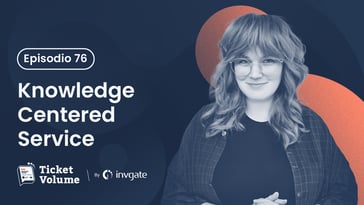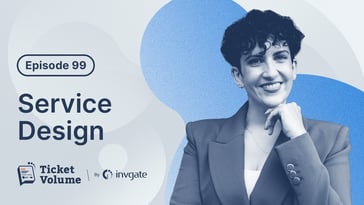Experience Management strategy is a powerful approach that can drive positive change within organizations. On the 63rd Episode of Ticket Volume, our IT podcast, Joshua Nelson, director of Technology Experience at Power Design, Inc., and renowned author of "Leadership Distilled, Serving with Purpose", guided us through the core elements necessary to develop a robust Experience Management strategy and drive organizational success.
Drawing from his extensive background in Business Administration, Management, Information Systems, and Enterprise Resource Management, Joshua provides practical strategies for implementing effective XM practices, such as the profound value of relationship-building throughout the XM journey.
Be sure to catch the full episode featuring Nelson. His approach streamlines communication, enhances coordination, and ultimately elevates overall satisfaction, so you might want to take notes for this one.
We invite you to take advantage of our monthly live recordings and gain access to industry experts. Participate in these sessions and have the chance to ask your questions directly, while learning from the best in the field. Don't miss out on this valuable opportunity to enhance your knowledge and skills.

Experience Management strategy best practices
At the heart of Experience Management lies the integration of employee experience (EX) and a personalized customer experience (CX), both of which where covered in episode 40 and episode 26 respectively, influencing various aspects such as product and brand perception. For that reason, Nelson emphasized the need for a cohesive support system that serves as a central hub for all user experiences. This inclusive approach not only streamlines operations and support but also yields tangible results.
When it comes to IT service delivery, measuring customer experience and emotion becomes paramount. Nelson introduced the concept of Experience Level Agreements (XLA), which shift the focus from conventional metrics to emotional connection, as there is a subjectivity of metrics to measure experience. This means prioritizing emotional experiences for organizations to foster stronger connections with their customers, ultimately leading to better overall experiences.
Still, he encounters people confused over what qualifies as an XLA, SLA, or SLO.
|
|
"I always tell people not to get caught up in the semantics of it. XLA, in my opinion, is just another agreement that you have with the company, and yes, it's experience-focused and attached more to the emotional side of it rather than the metric or statistics. However, I think that you're probably already capturing XLAs, whether or not you're calling them that. (...) The challenge is those things existed before we had the term XLA, so now they've kind of lived in this SLA world, but they probably should be XLAs. And that's why I just tell people not to get hung up on it, measure what matters, and you'll be okay." Joshua Nelson |
Research and feedback are integral components of a successful XM and an effective Digital Employee Experience Strategy (DEX). Our guest believes the key to drive improvement is to conduct thorough research and gather feedback.
For instance, pulse surveys and engaging conversations with department heads provide meaningful wisdom into the technology experience and help identify areas for enhancement. What he has found is that collaborative analysis of research findings allows organizations to extract true value and make informed decisions.
He gave the example of how, four years ago, there was no Director of Technology experience at Power Design. However, over time, as they focused on improving service and addressing aspects related to XM (even if not explicitly labeled as such), the role developed.
Nelson acknowledged that expecting immediate change or trying to forcefully impose XM on the organization is not realistic or effective. Instead, he suggested that building relationships and fostering understanding among stakeholders is crucial, hence shifting to a people-first culture. By doing so, there is a higher likelihood of successfully driving the organization toward the desired direction in terms of improving the overall experience.
For that to happen is pivotal to remove barriers and challenges in using technology, as this creates a more enjoyable experience for users; which means fostering positive relationships and inspiring others, so individuals can cultivate an environment where everyone is motivated to contribute to making improvements and driving positive change.
|
|
"When we're sending out communications, I want to make sure that we have an area to say, you know, questions, thoughts, concerns, let us know now, right before we roll it out. So we're capturing feedback before a rollout or capturing feedback after a rollout, and we're capturing feedback about just your everyday. And it's a lot of work. I don't wanna downplay the amount of effort that this takes. So although you know your reference as a luxury, and it is, but there's a lot of work that goes into making sure that the value is there." Joshua Nelson |
How Nelson manages his team to deliver the best experience
Nelson explained how his team is organized while highlighting the significance of integrating logistics into the overall end-user experience management. This integration includes handling shipping and receiving, as well as proactive problem-solving efforts. He thinks the addition of an adoption team is also crucial in ensuring effective technology usage by end users.
This integrated approach may initially be seen as a luxury, but Nelson believes it offers unique opportunities and benefits for both customers and employees. From an end-user perspective, their main concern is having their problems solved, regardless of the specific technical aspects or departments involved. And from a CX perspective, it’s about finding the sweet spot for improvement to maintain loyalty. Having all the necessary elements in one place means organizations can fulfill their purpose and become strategic partners to their customers.
Nelson predicts that in about a decade, more organizations will shift towards this inclusive experience management model, where the focus is on problem-solving and delivering exceptional experiences rather than departmental silos. The Return on Investment (ROI) of this approach is justifiable.
Additionally, he pointed out how necessary it is to maintain an acronym dictionary to avoid confusion and integrate logistics, such as having a dedicated FedEx account, to enhance the overall service provided.
Bottom line
This is just a summary of Ticket Volume's episode featuring Joshua Nelson. Be sure to listen to the full discussion with Matt Beran to learn more about his experience management strategy and learn the specifics of his unique integrated strategy that flirts with Greek methodology and sets the path to future frameworks.
You can find the full episode on popular platforms like Apple Podcasts, Spotify, YouTube, or any other podcast platform you prefer. Remember to subscribe if you're interested in joining the monthly live recordings!















